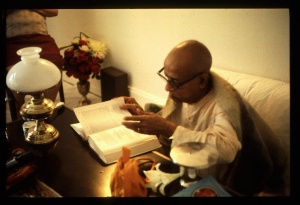CC Madhya 15.106

A.C. Bhaktivedanta Swami Prabhupada
TEXT 106
- prabhu kahe,—“yāṅra mukhe śuni eka-bāra
- kṛṣṇa-nāma, sei pūjya,—śreṣṭha sabākāra”
SYNONYMS
prabhu kahe — Lord Śrī Caitanya Mahāprabhu replied; yāṅra mukhe — in whose mouth; śuni — I hear; eka-bāra — once; kṛṣṇa-nāma — the holy name of Lord Kṛṣṇa; sei pūjya — he is worshipable; śreṣṭha sabākāra — the best of all human beings.
TRANSLATION
Śrī Caitanya Mahāprabhu replied, “Whoever chants the holy name of Kṛṣṇa just once is worshipable and is the topmost human being.
PURPORT
Śrīla Bhaktisiddhānta Sarasvatī Ṭhākura says that a person who simply chants the holy name of Kṛṣṇa once becomes perfect and should be regarded as a Vaiṣṇava. This is confirmed by Śrīla Rūpa Gosvāmī in his Upadeśāmṛta (5): kṛṣṇeti yasya giri taṁ manasādriyeta. With such faith in the holy name one may begin a life of Kṛṣṇa consciousness. But an ordinary person cannot chant the holy name of Kṛṣṇa with such faith. One should accept the holy name of Kṛṣṇa to be identical with the Supreme Personality of Godhead, Transcendence Himself. As the Padma Purāṇa states, “The holy name of Kṛṣṇa is identical with Kṛṣṇa and is like a cintāmaṇi gem, a touchstone. That name is Kṛṣṇa personified in sound and is therefore perfectly transcendental and eternally liberated from material contamination.” Thus one should understand that the name “Kṛṣṇa” and Kṛṣṇa Himself are identical. Having such faith, one must continue to chant the holy name.
When one is situated on the neophyte platform, one cannot understand the devotional ingredients of a pure, unalloyed devotee. However, when the novice engages in devotional service—especially in Deity worship—and follows the order of a bona fide spiritual master, he is a pure devotee. Anyone can take advantage of hearing about Kṛṣṇa consciousness from such a devotee and thus gradually become purified. In other words, any devotee who believes that the holy name of the Lord is identical with the Lord is a pure devotee, even though he may be in the neophyte stage. By his association, others may also become Vaiṣṇavas.
One is known as a materialistic devotee if he simply worships the Deity of Hari with faith but does not show proper respect to the devotees and to others. This is stated in Śrīmad-Bhāgavatam (SB 11.2.47):
- arcāyām eva haraye pūjāṁ yaḥ śraddhayehate
- na tad-bhakteṣu cānyeṣu sa bhaktaḥ prākṛtaḥ smṛtaḥ
Yet even by associating with such a neophyte devotee, one can become a devotee also. When Lord Caitanya was teaching Sanātana Gosvāmī, He said:
- śraddhāvān jana haya bhakti-adhikārī
- ‘uttama’, ‘madhyama’, ‘kaniṣṭha’—śraddhā-anusārī
- yāhāra komala-śraddhā, se ‘kaniṣṭha’ jana
- krame krame teṅho bhakta ha-ibe ‘uttama’
- rati-prema-tāratamye bhakta-taratama
“A person who has attained firm faith is a real candidate for advancing in Kṛṣṇa consciousness. According to the faith, there are first-class, second-class and neophyte devotees. One who has preliminary faith is called a kaniṣṭha-adhikārī, or a neophyte. The neophyte, however, can become an advanced devotee if he strictly follows the regulative principles set down by the spiritual master. Therefore it is on the basis of faith and attachment to Kṛṣṇa that one can judge who is a madhyama-adhikārī or an uttama-adhikārī.” (CC Madhya 22.64, 69, 71) It is thus concluded that even a neophyte devotee is superior to the karmīs and jñānīs because he has full faith in chanting the holy name of the Lord. A karmī or a jñānī, regardless of his greatness, has no faith in Lord Viṣṇu, His holy name or His devotional service. One may be advanced religiously, but if he is not trained in devotional service, he has very little credit on the transcendental platform. Even a neophyte devotee engaged in Deity worship in accordance with the regulations set forth by the spiritual master is in a position superior to that of the fruitive worker and speculative philosopher.